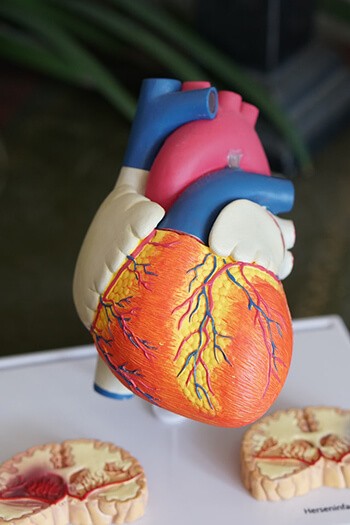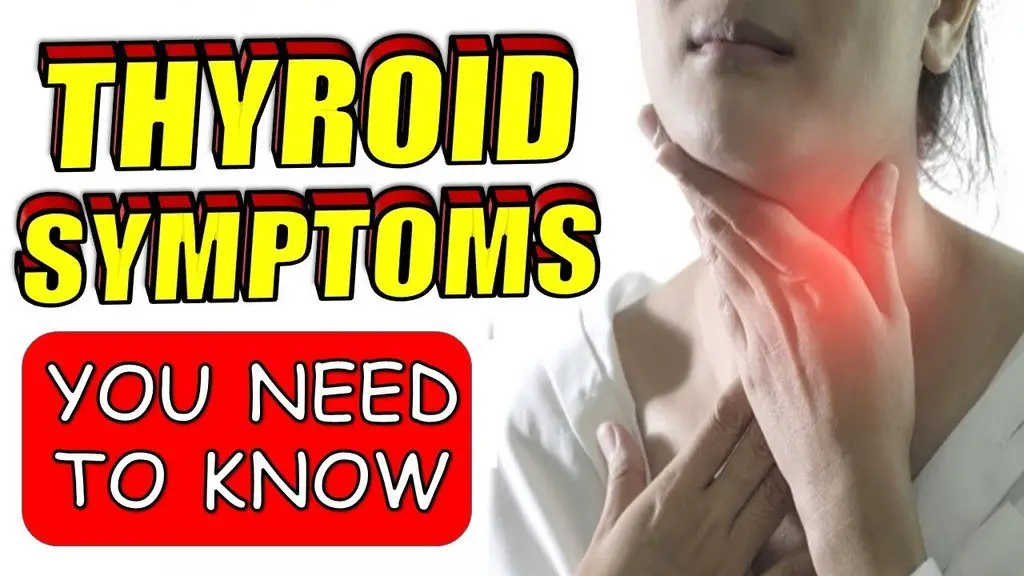There are a number of thyroid disorders, but the most common of them all is hypothyroidism. Hypo- means deficient or underactive, and hypothyroidism is a condition in which the thyroid gland is underperforming or producing too little thyroid hormone.
Recognizing the symptoms of hypothyroidism, or even a slightly “off” thyroid and thyroid problems, is extremely important. The earlier you detect the symptoms and bring your concerns to your doctor's attention, the sooner you can begin receiving proper treatment to manage your thyroid issues.
There is an endless list of symptoms that can be associated with thyroid problems. Of course, the problem with many of these symptoms is that they can also come about quite naturally on their own, and don’t actually have anything to do with your thyroid.
For that reason, you’re feeling a little off-colour, and this feeling continues for several days of weeks, it’s best to visit your doctor and present all of your symptoms. Your doctor will then be able to carry out the tests you need.
So without further ado, let’s get into the symptoms of thyroid problems, broken down into 20 categories.
1. Energy Level and Sleep


People with thyroid problems may experience chronic fatigue, less stamina than others, and may need a longer recovery period after any activity. They may have an inability to concentrate, and certain factors may disrupt their sleep, like sleep apnoea, snoring, and insomnia.
For this reason, if you have thyroid problems, you’re more likely to rely on taking naps in the afternoon, you may feel weakness when carrying out day to day activities, and you may wake feeling tired or frequently oversleep.
2. Weight


One of the most common symptoms of a thyroid problem is weight gain. People with thyroid problems, especially hyperthyroidism, may find that they have an inability to lose weight, and are experiencing something called ascites, or abdominal fluid accumulation.
Thyroid issues are often paired with metabolic syndrome, obesity, and heightened appetite. On the other end of the scale, you may have a thyroid problem that leads to weight loss and anorexia – the lack of desire to eat, different from the eating disorder, anorexia nervosa.
3. Body Temperature


It’s pretty standard for people with thyroid issues to have cold extremities, such as their nose, hands, and feet unless they’re in a particularly warm environment. Thyroid issues can lead to cold sweats and night sweats, as well as an intolerance to heat and cold.
People with thyroid issues may experience “internal shivering” and hypothermia, as well as clammy palms and either too much or too little perspiration. It’s also common for them to have a low basal body temperature, which is generally anything below 97.8 degrees Fahrenheit.
4. Slowness
If you have slow movements and slow speech compared to your peers, you may have a thyroid problem. Other common issues related to slowness include a slowed Achilles reflex, or the ankle jerk reflex when the achilles is tapped in a certain place. You may also have diminished reflexes elsewhere on your body.
5. Infections


When you have thyroid issues, you’re more likely to experience frequent infections and chronic illnesses. Thyroid problems tend to cause issues inside the immune system, which can lead to frequent colds, frequent flu, and greater susceptibility to respiratory conditions like bronchitis.
You may have a hard time recovering from infections, and you may commonly experience sinus infections, skin, ear, nose and throat infections, candida, pelvic inflammatory disease, and repeated infections of the urinary tract and respiratory tract.
6. Related Autoimmune or Endocrine Diseases
Recent research has found that there is a strong link between thyroid problems and a number of autoimmune or endocrine diseases, including Hashimoto’s disease, Graves’ disease, celiac disease, type 1 and type 2 diabetes, Addison’s disease, Cushing’s disease, and pernicious Anaemia. As a woman with thyroid problems, you may experience premature ovarian decline and/or failure.
Additional conditions that are related to thyroid problems include alopecia, Reynaud’s syndrome, chronic fatigue syndrome, rheumatoid arthritis, multiple sclerosis, vitiligo and psoriasis.
7. Swelling and Thickened Skin


Another very common symptom of some thyroid disorders is swelling and thickened skin. You may notice that certain areas of skin, including that on and around your eyes, face, lips, neck, hands, arms, legs, feet, and ankles, are all swollen or thicker than they were previously.
8. Mouth and Throat


There are several symptoms that relate to the mouth and throat that are often found in people with thyroid problems. If you have problems swallowing, a sensation of a lump in your throat or pressure on your throat, pain and tenderness in your neck or thyroid area, difficulty taking a deep breath, or a burning sensation in your throat, and these symptoms last for more than a week, it’s worth checking things out with your doctor.
Other mouth and throat symptoms include sore throats, a swollen tongue, choking fits, a distorted sense of taste, salt cravings and sweet cravings, speech problems, a dry mouth, bad breath, and a low, husky and hoarse voice. You are also more likely to have oral hygiene problems like gum disease if you have thyroid issues.
9. Ears
People with thyroid issues often report on a number of symptoms relating to their ears, including oversensitive hearing, ringing and hissing in their ears, deafness, tinnitus, internal itching of their ears, a dry, scaly ear canal, and excess earwax.
10. Eyes
Similarly, there are also a number of eye symptoms that may indicate thyroid issues, including poor focusing, double vision, dry eyes, gritty eyes, achy eyes, blurred vision, drooping eyelids, sensitivity to light, frequent tics, or tiny muscle spasms, in the eyes, bulging of the eyeballs, red and inflamed eyes, dark rings under eyes, and puffiness around the eyes. People with thyroid problems are also more likely to have eye conditions like glaucoma and cataracts.
11. Hair


If you notice any obvious changes to your hair growth at any time, it’s often a sign that something isn’t quite right. Hair does gradually change in texture and thickness with age, but rapid and sudden changes may relate to thyroid issues.
Hair loss and dry, frizzy, brittle, and coarse hair are all symptoms of thyroid problems. If you have finer hair, premature baldness or grey hair, loss of hair on your body, and loss of eyelashes, this may also point towards a thyroid problem.
12. Nails
Take a look at your nails and see if they seem brittle, pale, soft, yellowish, or ridged. If your nails are weak, and it doesn’t take a lot for them to break, you may have a thyroid issue. You might also notice thickened nails or ingrown toenails on your feet.


13. Skin
Our skin never seems to be quite perfect, but if you notice a combination of skin problems, it may be time to consider testing for thyroid problems. Dry skin, including on your scalp, flaky skin, cracked heels, and a yellowish or amber tint to your skin are often signs of thyroid problems.
You may also have pale skin and lips, boils and pigmentation on your skin, and you may be more susceptible to rashes, skin tags, eczema, cellulitis, bruises, and blood clots. It may take longer for surface wounds to heal on your skin, and you may have acne, especially on your chest and arms.
14. Numbness and Tingling


Feeling a numbness or tingling sensation in certain areas of your body is common if you have thyroid problems. Especially look out for this sensation in your legs, feet, arms, hands, back, and face.
15. Pain


Unfortunately, having thyroid problems can make you more susceptible to conditions that cause pain. You may find that you suffer from frequent migraines and chronic headaches, wrist pain, back pain, muscle and joint pain, and joint stiffness.
A number of pain conditions are associated with thyroid problems, including carpal tunnel and tarsal tunnel syndrome, tendonitis, gout, and fibromyalgia.
16. Digestion
For people with thyroid problems, digestion can be a real issue. It’s common to deal with constipation, food allergies and sensitivity, alcohol intolerance, IBS, lactose intolerance and Celiac disease, colitis, gluten sensitivity, excess gas, acid reflux, nausea, and ulcers if you have thyroid problems.
17. Menstrual Disorders


Women with thyroid problems may experience gender-specific symptoms including the cessation of periods, light, heavy or irregular periods, very long cycles, severe cramping, constant bleeding, heightened PMS or PMT, delayed puberty and menopause, difficult menopause, and endometriosis.
They may also be at greater risk of infertility, miscarriage and stillbirth, and may have abnormal oestrogen, progesterone, and testosterone hormonal levels. Men with thyroid problems may experience a drop in sperm count, erectile dysfunction, and loss of libido.
18. Emotional


We’re only now beginning to understand how the mind and the body are linked. People with thyroid problems are more likely to experience emotional issues, including irritability, mood swings, anxiety, the need to be alone, feelings of resentment, and a lack of confidence. They may be jumpy and nervous.
19. Brain
On a similar note, people with thyroid problems may experience issues that go beyond their general mood and emotions, including depression, panic attacks, memory loss and confusion, poor concentration, mental sluggishness, hallucinations, obsessions, and rage.
There is also a link between thyroid problems and dementia, Alzheimer’s, and Parkinson’s.
20. Heart


It’s common for people with thyroid problems to have issues with blood pressure and pulse. You may have heart flutters or heart palpitations, chest pain, high cholesterol, high levels of HDL or bad cholesterol, coronary artery disease, poor circulation, fluid retention, and an enlarged heart. People with thyroid problems are at more risk of stroke and heart attack.
Thyroid problems natural remedies
Some of the symptoms and disorders associated with thyroid problems seem quite gloomy, but remember that if you have thyroid problems, in no way are you sentenced to experiencing every one of these symptoms discussed in this video. Often, if you can manage your thyroid problems naturally before needing medical attention, you may not experience any of the more life-threatening symptoms at all.
Some of the best natural remedies for thyroid problems are:
1. Coconut oil


Coconut oil has medium-chain fatty acids that help in better functioning of the thyroid gland. Coconut oil, specifically when you take it in a non-heated form, helps lose weight, increases metabolism, and balances body temperature.
2. Apple cider vinegar


Apple cider vinegar helps in the balanced production and expression of hormones. It improves metabolism and helps to alkalize the body environment.
3. Ginger
Ginger is rich in essential minerals like potassium and magnesium and helps combat inflammation, one of the primary causes of thyroid issues. It’s easiest to have ginger tea.
4. Vitamin D
Deficiency of vitamin D can lead to thyroid problems. Since the body can produce it only when exposed to the sun, make sure that you get a minimum of 15 minutes of sunlight daily.
5. Almonds


Most nuts are beneficial to the body in some way or the other. Almonds are best suited for proper thyroid expression. They’re a good source of protein, fibre, and minerals.
Conclusion
- Support healthy thyroid function - with our powerful thyroid complex, which contains key nutrients that promote thyroid health and function
- Support thyroid health - with our thyroid support supplement to support your body's natural energy levels and help you feel more rested and energized throughout the day
- Support overall wellness - with our proprietary blend, which contains ingredients such as ashwagandha root, magnesium, bladderwrack, cayenne pepper
- Non-GMO and Allergen-Free: Our product is free from genetically modified organisms and common allergens, catering to a wide range of dietary needs and preferences.
- Thyroid Health Nourishment: Our Thyroid Support Complex is a blend of vitamins, minerals, and herbal extracts for optimal thyroid health*
- Optimized Hormone Function: Supports thyroid hormone synthesis and metabolism with iodine, l-tyrosine, and ashwagandha*
- Antioxidant Infusion: Thyroid Support Complex contains vitamin A, C, selenium, and turmeric to support the functioning of your thyroid cell metabolism*
- Suggested Use: As a dietary supplement, take 2 thyroid support capsules daily, with a meal
- Double The Competition: We give you a full two months’ supply, 120 capsules, in each bottle of our thyroid supplement. That’s twice the amount you’ll typically find out there and ensures you receive the full benefit of our potent glandular formula.
- Energize Your Thyroid: An underactive thyroid is associated with brain fog, lethargy, and more. Our thyroid support complex combines 14 key ingredients including Vitamin B12, L-Tyrosine, Iodine, Ashwagandha Root, and more to help maintain the normal function of a healthy thyroid.
- Improve Blood Flow: In addition to minerals such as Zinc, Copper, Magnesium, Manganese, and Selenium, as well as herbs Schisandra and Bladderwrack known to aid in the formation of thyroid hormones, we include Cayenne Pepper Powder to help bring these nutrients to all parts of your body.
- Manufactured To Rigorous Standards: Our non-GMO vegan capsules are created right here in the USA in a CGMP-certified facility, using globally sourced ingredients, so you can rest assured that what it says on the label is what you’ll get in every bottle.
- Supports Restful Sleep & Daytime Energy: Thyroid Support helps smooth out the stress-response cycle*
- Provides Immune Support: Ashwagandha root helps rejuvenate your endocrine and immune systems
- Supports Healthy Metabolism: Thyroid Support blends iodine-containing plants to support your thyroid
- Purity-Tested: Our Thyroid Support supplement is vegan, organic, and proudly made in NC, USA





